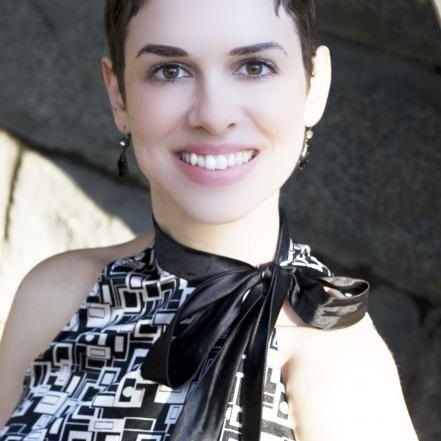Kinneret Ely
Soprano
About
BROADCAST ON KOL HAMUSICA PLAYLIST:
https://www.youtube.com/watch?v=pUZniBr3Ddc&list=PL0Se0kaj9dEY_-Vt4_c7fN05X7EnwD2EB
BIO:
Soprano Kinneret Ely is a freelance opera singer based in New York City. She competed in the Montserrat Caballé International Singing Competition in Zaragoza, Spain in September 2014 and was a semifinalist in the 2013 Jenny Lind Competition. Her concert at the Felicja Blumental Music Center, with pianist Dan Deutsch and flutist Anna Kondrashina, was broadcast on Kol HaMusica in November 2015. She sang the role of Rosina in Il Barbiere di Siviglia with Opera NOVA in November 2015. She sang the role of Gilda in Rigoletto in May 2014 and Madame Cortese in Il Viaggio a Reims in December 2013, both at the Conservatory of Music of Brooklyn College. She participated in the Martina Arroyo Foundation's Role Preparation program, the International Vocal Arts Institute in Tel Aviv, Israel and Si Parla, Si Canta in Urbania, Italy. Her scenes roles include Madame Herz in Der Schauspieldirektor, Norina in Don Pasquale, Gilda in Rigoletto, and Violetta in La Traviata. She studied voice with Carlos Conde, W. Stephen Smith, Claudia Friedlander, Lucy Arner, and Joan Dornemann. She has studied Italian at the Società Dante Alighieri in Siena, Italy, French at the Alliance Française in Paris, France, and German at the Goethe Institut in Berlin, Germany. She graduated cum laude from the interdisciplinary Thomas Hunter Honors Program at Hunter College. Born in New Haven, Connecticut, Kinneret was raised in Williamsburg, Virginia and Jerusalem, Israel.
"No Bernstein tribute would be complete without selections from Candide, and indeed we had two. The first was 'Glitter and Be Gay', a coloratura showstopper requiring a singer to be Queen of the Night and a Rockette all rolled up into one. Soprano Kinneret Ely was both, giving a high-energy performance." -Rorianne Schrade, New York Concert Review
A BIT MORE ABOUT ME:
The more I've been finding my voice as a singer, the more I've been finding it as a person as well.
I'm most inspired by people who use their authentic voices (singing or not) to bring positive change to the world, just as I felt Leontyne Price did when I heard her recording of "D'amor sull'ali rosee" for the first time in my flourescent-lit dorm room in college and was reduced to tears, or when I heard Joyce DiDonato sing "Una voce poco fa" in the first Met HD I ever saw, Il Barbiere di Siviglia. (I have so many other role models who are inspirational to me, from singers, to dancers, to entrepreneurs, and people in all walks of life. But I digress...) I aspire to bring this kind of difference to other people's lives, and the best way I know how is by being involved in an art form that requires me to use my unamplified, natural voice--being an opera singer.
Although I've had the opportunity to travel to and study in Italy, France, and Germany, I've learned that there is no adventure more thrilling or important than that of finding out exactly WHAT your authentic voice is, and how to bring it out and live wholeheartedly, onstage and off. The journey can be scary at times, but it has always been worthwhile.
Several years ago, I needed to start rebuilding my voice technique from scratch. That was a turning point, because I learned that deep down I not only want to sing (though I do), but that I HAVE to sing--not in order to get approval, but for myself. I then asked myself: What do I need to say, and need it so badly that I need to study voice technique, drama, languages, literature, and history, in order to say it?
This is what brings me here.
I've had an unusual path as a singer. I'm an American-Israeli who comes from a family of professors and teachers, and among the things I studied growing up were piano, guitar, and dance. I couldn't have predicted then that I would eventually pursue a career as an opera singer, and although it has been incredibly rewarding, it involved difficult decisions.
I started my college education at conservatory, and then realized that as a singer, I would feel much more prepared for a singing career and more fulfilled, if I spent my undergrad years in a liberal arts school, while studying voice and coaching privately. I went on to finish my degree at Hunter College, designing my degree there in languages, literature, and history. It was scary to break away from what looked like a "sure" path to an operatic career (that is, going seamlessly from bachelors and masters degrees from conservatories, to Young Artist Programs, and then to a professional career.) However, it ended up being, for me, one of the best decisions I ever made. By customizing my education in this way, I have had the opportunity to learn about the world around me in a way that heavily informed the repertoire I now sing. I studied Italian, French, German, Russian, literature, and history. (I can officially cross reading Goethe's Faust in German off my life list! Oy vey!) :)
However, the most important thing I gained from going this path was learning that there are as many paths to being an opera singer as there are singers, and not to be afraid to go my own way in building an opera career. There is something about learning how to sing with no amplification whatsoever that forces you to dig deeper as a person than you ever could have thought imaginable. I think opera is an art form with an amazing legacy of singers, composers, and artists who had the courage to share their authentic voices with the world, and I am honored to be exploring and discovering through this art form. This is why I'm here, and this is what I want to be a part of.
See more here: http://www.kinneretely.com/blog/

 Continue with Facebook
Continue with Facebook
 Continue with Google
Continue with Google
 Continue with Apple
Continue with Apple









